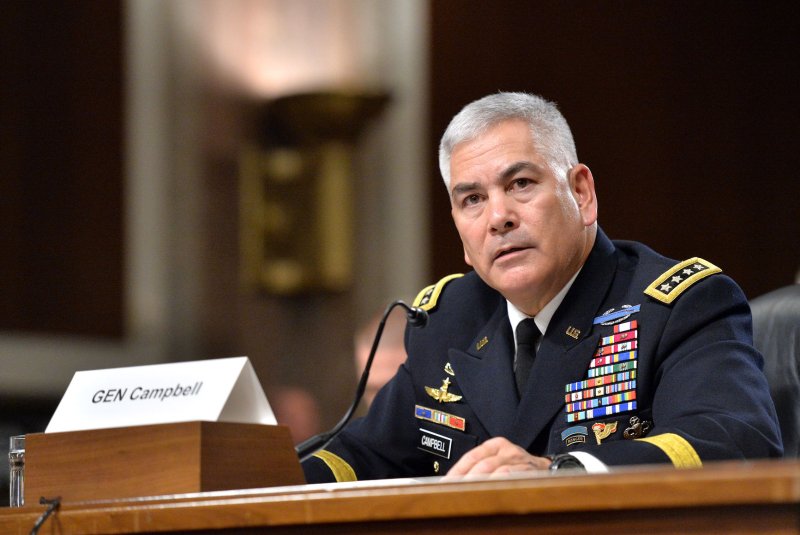Gen. John F. Campbell, the top U.S. commander in Afghanistan, testifies Tuesday during a Senate Armed Services Committee hearing on the ongoing situation in Afghanistan. Campbell said a recent U.S. airstrike on a Doctors Without Borders hospital in Kunduz, Afghanistan, was a mistake. Photo by Kevin Dietsch/UPI. |
License Photo
WASHINGTON, Oct. 6 (UPI) -- Gen. John Campbell, the top U.S. commander in Afghanistan, said Tuesday he has ordered coalition forces in the country to undergo rules of engagement training after a U.S. airstrike on a hospital in Kunduz killed 22 civilians.
The comments come one day after Campbell told reporters Afghan forces called in the Saturday airstrike, which was conducted by an AC-130 gunship, killing 10 patients and 12 staff members with Doctors Without Borders, or Médecins Sans Frontières.
"To prevent any future incidences of this nature, I've directed the entire force to undergo in-depth training in order to review all of our operational authorities and rules of engagement," ABC News quoted Campbell as saying Tuesday before the Senate Armed Services Committee.
Telling senators U.S. forces "would never intentionally target a protected medical facility," Campbell asserted he could not go into the specifics of the incident due to the ongoing nature of the investigation, which he promised would be "thorough, objective and transparent."
The airstrike came as Afghan forces fought to regain the northern city of Kunduz from the Taliban, which seized the city late last month in the most significant urban victory for the insurgents since their fall from power in 2001.
"The Afghan forces on the ground requested air support from our forces there on the ground," Campbell said Tuesday, "but as I said in my opening statement, even though the Afghans requested air support, it still has to go through a rigorous U.S. procedure to enable fires to go on the ground."
The hospital, which was occupied by 80 MSF staff and 105 patients, was bombed every 15 minutes for more than an hour early Saturday, according to MSF.
MSF has said it "cannot accept that this horrific loss of life will simply be dismissed as collateral damage."
"There can be no justification for this horrible attack," Christopher Stokes, MSF General Director, said in a statement Monday. "With such constant discrepancies in the U.S. and Afghan accounts of what happened, the need for a full transparent independent investigation is ever more critical."















